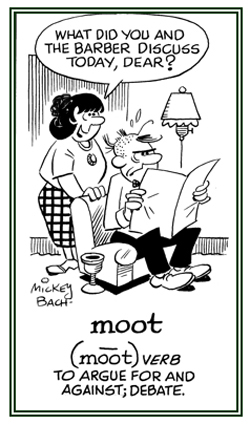Contranyms
(Jekyll-and-Hyde words; words that have two distinctly contrary or even opposite meanings)
biweekly (adjective) (not comparable)
1. Occurring twice a week: The magazine that Judy subscribed to appeared biweekly.
2. Occurring every two weeks; fortnightly: Sally emptied her wastepaper basket biweekly, on Saturdays and on Wednesdays.
2. Occurring every two weeks; fortnightly: Sally emptied her wastepaper basket biweekly, on Saturdays and on Wednesdays.
bolt (verb), bolts; bolted; bolting
1. To secure or to connect: Before Sam left the barn, he bolted the lock, or bolt, to the sliding door.
2. To depart freely: Jack could see the man bolt out the door as the owner of the house came home.
2. To depart freely: Jack could see the man bolt out the door as the owner of the house came home.
cleave (verb), cleaves; cleaved; cleaving
1. To stick together: Judy cleaved or adhered to her principles.
Some children cleave or cling to their parents.
2. To split up: After Jay sharpened the axe, it easily cleaved the log.
clip (verb), clips; clipped; clipping
1. To attach: Mark asked his friend to clip the note to the paper.
2. To remove: David's mother is going to clip his hair.
2. To remove: David's mother is going to clip his hair.
Mr. Smith is clipping the hedge right now.
dust (verb), dusts; dusted; dusting
1. To remove material: Linda's mother said, "Dust the shelves and the furniture please."
2. To lay down material; to cover: The farmer is going to dust the crops today.
2. To lay down material; to cover: The farmer is going to dust the crops today.
go off (verb, goes off; went off; going off;
1. To start: The alarm will go off and buzz at seven o'clock in the morning.
2.To end: The TV show will go off at midnight.
2.To end: The TV show will go off at midnight.
1. Very much; a large amount: The new TV that Nancy bought cost a good deal, or was very expensive.
2. Very little; as a bargain: Mrs. Smart looked for a good deal at the garage sale and found a nice book for 50 cents!
2. Very little; as a bargain: Mrs. Smart looked for a good deal at the garage sale and found a nice book for 50 cents!
An expensive car costs a good deal of money, but someone might get a good deal on a cheaper model.
left (verb), leave (infinitive); leaves; left; leaving
1. Departed from: Greg left the office an hour ago.
2. As an adjective: remain; not used up: Mrs. Small said that there wasn't much food left following the party.
2. As an adjective: remain; not used up: Mrs. Small said that there wasn't much food left following the party.
moot (verb), moots; mooted; mooting
To present an idea or a topic for debate or discussion: The tax issues have been mooted in Congress and they will be points of arguments for a long time.

© ALL rights are reserved.
Go to this Word A Day Revisited Index

Go to this Word A Day Revisited Index
so you can see more of Mickey Bach's cartoons.
1. Material for sticking things together (no pl): Mortar can be a wet substance that is spread between bricks or stones and which holds them together when it hardens.
2. A device, or weapon, for blowing things apart with shells: The soldiers came under mortar fire.
2. A device, or weapon, for blowing things apart with shells: The soldiers came under mortar fire.
Bricks require mortar to stick, or hold, them together, but a mortar shell would blow apart a brick wall.
out (adverb) (not comparable)
1. Invisible: Grace's mother asked her to turn the lights out.
. The stains came out of the shirt.
2. Visible: Tom said, "The moon and stars are out tonight."
overlook (verb), overlooks; overlooked; overlooking
1. To look over or not to consider someone for a job, position, promotion, etc.: The ball player was overlooked by the other teams.
2. To fail to see or to notice (look over) something: The detective overlooked an important clue.
2. To fail to see or to notice (look over) something: The detective overlooked an important clue.
1. A person of the same civil ranking or standing before the law: Mr. Thompson was respected and admired by his peers.
2. A person of noble birth: Mr. Hathaway was given the peerage (rank of a British peer or nobility) after years of devoted service to the community.
2. A person of noble birth: Mr. Hathaway was given the peerage (rank of a British peer or nobility) after years of devoted service to the community.
put up (verb), puts up; put up; putting up
1. To construct: A building will be put up on this site next month.
2. To disassemble; Mrs. Jackson told her little boy ,"Put up your toys and get ready for bed."
2. To disassemble; Mrs. Jackson told her little boy ,"Put up your toys and get ready for bed."
ravel
1. To entangle; to tangle; to complicate: The fact that the road was under construction raveled up the family's trip to the seaside making it very difficult to get there in one day.
2. To disentangle: The fabric will ravel and fray into separate threads in the washing machine.
2. To disentangle: The fabric will ravel and fray into separate threads in the washing machine.
Showing page 1 out of 2 pages of 19 main-word entries or main-word-entry groups.

